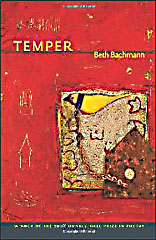
Temper is Beth Bachmann’s first collection of poetry. The book, winner of the 2008 Donald Hall Prize in Poetry, is dedicated to the memory of Bachmann’s sister, who was murdered at the age of eighteen in 1993. Indeed, the collection concerns itself with her sister’s murder, the process of grief in the face of such traumatic circumstances. In this, Bachmann, who teaches creative writing at Vanderbilt University, describes her collection as “a radical re-envisioning of elegy.” An elegy is often thought of as bringing “closure” to death, but as Bachmann further notes, her poems “turn and return to heat and the absence of heat, color and the absence of color,” and in this almost tidal sense of the impact of unresolved events we get an often haunting image of time juttering forward and back ceaselessly, lives never completely explained or tragedy never finally understood.
Focused as these poems are on a tragic murder, the collection may also be viewed as a classic murder mystery, the ravaged body found by the railroad tracks, clues pointing to a murderer, but to whom? Who done it? And indeed, in “Paternoster,” the opening poem in the first section, Bachmann invites us to:
Move closer. I want to tell you a story. It has its blood knots, its changing water,
the usual lures: family, violence, a margin left bare for interpretive remark.
Who done it, indeed. The poems about her father present a picture of a conflicted man. In “First Mystery of My Father,” she writes, “Yes, my father wanted to become a priest,/then met my mother, the story goes.”
It always conjures up the truly unfathomable, not a mystery in the sense of a puzzle to be solved but a mystery in the sense of something that simply cannot be understood.
The word “mystery” appears in the titles of twelve of the fifty poems in the collection. It always conjures up the truly unfathomable, not a mystery in the sense of a puzzle to be solved but a mystery in the sense of something that simply cannot be understood. Explanations only amount to interpretations. The poem, “Mystery Beneath a Handprint of Light” captures this beautifully:
In another rendering, the repetition might add up
to something other than evidence.
A dog could signal devotion.
One sister: the object of desire.
With any luck, we would walk away
with a target, a seizure or a silver buckle.
When we look up here, we do not see Orion;
we see a silhouette shot full of holes.
The ultimate “mystery,” therefore, goes way beyond this or that riddle, this or that crime, but to the heart of existence and grief themselves. The poem, “Luminous Mystery,” begins: “Darwin describes the death of God as the coming of light.”
If all mystery is subject to interpretation, Bachmann further suggests in such poems as “Defense Language,” “Answering Machine,” “Gene Mapping” and “Radio,” what is the secret code language to unlock the mystery, finally resolve it, and isn’t it all rather futile, after all?
Bachmann writes short poems, averaging maybe ten lines. They’re usually long lines and full of an allusive ambiguity that excites the reader’s imagination. Take the first two lines of “Sirens,” for instance:
Almost nothing can be destroyed by a voice. No matter how beautiful,
it’s no weapon. Don’t believe me?
The declarative sentence is almost immediately undermined by a sense of doubt, and we’re back to the essential mystery. And why a “beautiful” voice? Is “beauty” what one thinks of when one thinks of a weapon?
In all of this, Bachmann brings to mind Emily Dickinson, with her short, suggestive poems. Dickinson’s poetic dictum can certainly be applied to Bachmann as well: “Tell the truth but tell it slant.”
There is much to admire about Beth Bachmann’s poetry. This review is only intended to suggest a starting point. See for yourself.

